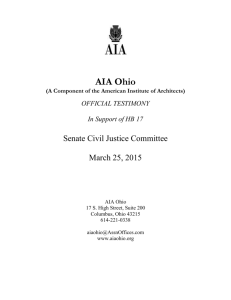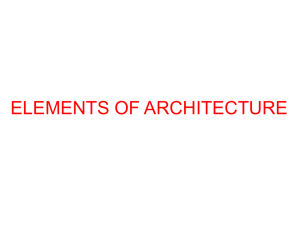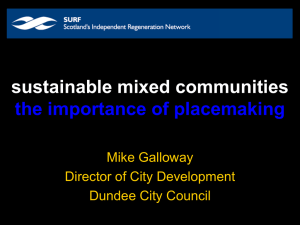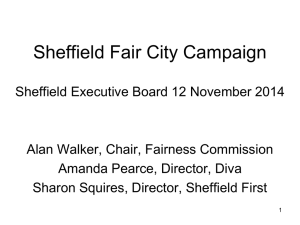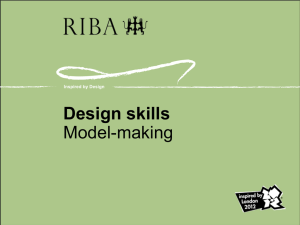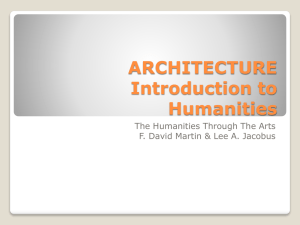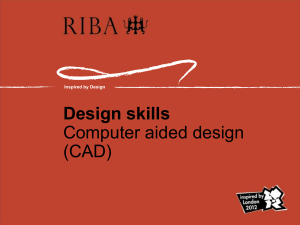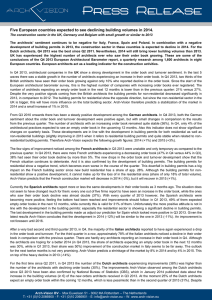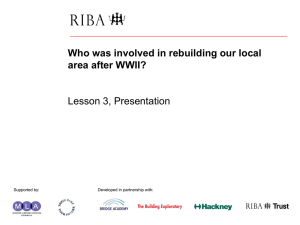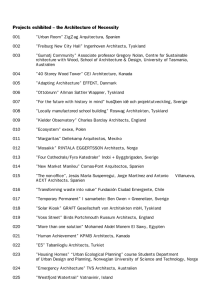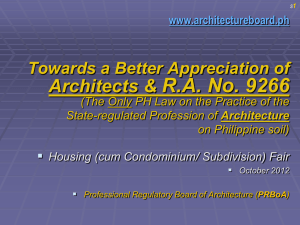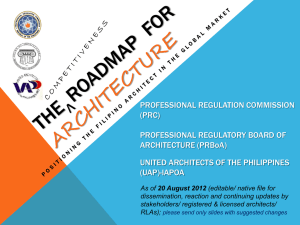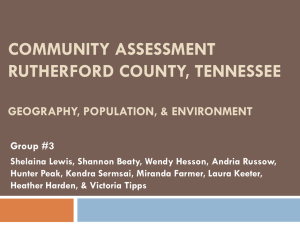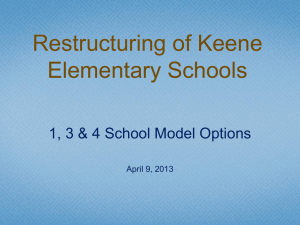Home Improvements - Scottish Universities Insight Institute
advertisement
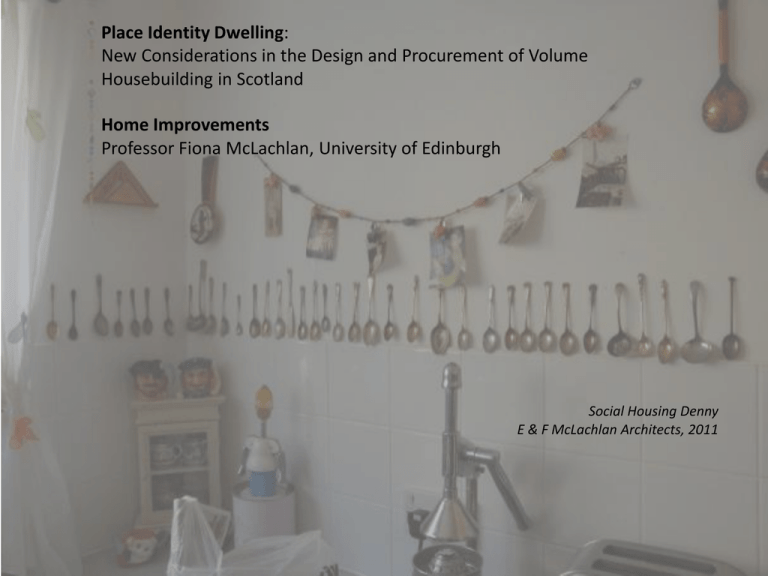
Place Identity Dwelling: New Considerations in the Design and Procurement of Volume Housebuilding in Scotland Home Improvements Professor Fiona McLachlan, University of Edinburgh Social Housing Denny E & F McLachlan Architects, 2011 Own work E & F McLachlan Architects – place, identity, social cohesion SUBURBAN : South Gyle (1995-97) • inward looking, social and physical focus • increased density compared with surrounding VHB housing • protective “defensible space” • clarity in public/private thresholds • inclusive – rented and shared ownership including first shared ownership wheelchair user housing URBAN: Brownfield Holyrood North (1996-2000) • brick island • hierarchy of urban spatial thresholds public and semiprivate • very high density • low income SEMI – RURAL EDGE: Whitburn, West Lothian (2007) • urban role, defining the gateway, reinforcing the edge • fronts and backs • social cohesion, mixed development, wheelchair user, frail elderly, mainstream Eigenhaard housing, Amsterdam Michel de Klerk The expression of the entrance the entrance threshold, shared space Psychologically significant, protection, privacy What do all these have in common? - Social housing - Non-profit organisations - Expectation of architect – led, traditionally procured RURAL TOWN Denny (2011) • innovative land release, informal terrace, socially integrated Volume House Building Design at the Heart of House Building 2007-8 Methodology The broad method, consisting of three phases was set by the terms of the Scottish Executive’s Research Brief: • an initial widespread email questionnaire • followed by a series of semi-structured interviews with a sample of house builders to investigate key issues in more depth, and • a series of case studies developed in more detail from the second stage findings to highlight good practice Interview themes • • • • • • definition of design quality the integration of design into the development process the influence/role of ‘one-off’ design priorities in terms of design positive and negative influences on design quality good practice examples www.scotland.gov.uk/Publications/2007/11/08110758 Defining design quality • the definition of design quality is a complex mix of factors (internal design; external building design; site layout and urban design; buildability) • developers believe customers’ interests do not reflect what they believe designers (i.e. architects) are predominantly interested in concerning design Developers comments: “Quality as a place to live…..Design quality is the branding of the company…It is not about architecture, but about a good quality product that is constantly honed…Liveability and usability…..Ease of build versus cost of building…good design is what sells….privacy, good spec, good amenity….design is wide ranging - it is part of everyday activity…the balance between functionality and cost….traditional or contemporary” LAND RELEASE CRITICAL - Land acquired through competitive bids tends to need to be developed quickly resulting in standardised products and reduced design time - Land which has been ‘land banked’ offers more opportunity for architectural input more likely to be used for ‘one-off’ or customised - Cul de Sacs – often generated by random release of land parcels - More recently increased emphasis on place-making and identity, masterplanning and the design of infrastructure should help - Developers need to reduce risk in planning process and masterplanning can give more certainty BUSINESS MODEL CRITICAL - Market – high, low, mid-range defines investment in ‘design’ - Profit margins higher at high end, more time invested in design, identity, image - Cost of land therefore directly affects design time invested - Lack of ‘Buildability’ is seen as the main issue in one-off architect designs The location of new housing development is critical, as is layout and design. We do not intend to repeat the mistakes of the past with large, single-tenure housing estates, poorly connected to jobs and services or dependent on the private car for those connections and designed in a way that does not foster a sense of identity or community. Good design is about more than just architecture and the aesthetics of individual buildings. Some of our finest conservation areas are not necessarily defined by great individual buildings but by the spaces they enclose.” Firm Foundations, 2007 p 13 Forward by Nicola Sturgeon Evolving Scottish housing policy 2007-2011 Designing Places PAN 83 Masterplanning Designing Streets 2008 2008 2010 Creating Places Scottish Planning Policy - 2014 Literature Review - Evolving Scottish Guidance and Planning Policy 2010-2014 Variation and standardisation in design • standard house types are normal and repetition is seen as providing better quality in terms of liveability, usability, and build quality through trial, testing and evolution • bespoke or ‘one-off’ design tend to be solutions for specific sites, to suit topography, planning briefs • bespoke designs may not provide better build quality but usually better urban design Image credits: http://donald-tnytciglargeprint.blogspot.com/2007/12/120107.html, Mactaggart & Mickell Cutting the cloth Constructing the analogy Developers made reference to external “jackets” used on standard internal layouts to suit specific sites, regional materials, planning requirements, and markets favouring ‘contemporary’ or ‘traditional’ Image credits: www.henrypoole.com Mactaggart & Mickel “Raasay Rural” apartment As dressed by Roan Rutherford of Wren Rutherford Austin-Smith:Lord at the Drum, Bo’ness In suburban attire In rural attire Mactaggart & Mickel “Staffa” house Ambiguity Houses as product • Marketing of private housing is dominated by constructed lifestyles • Customers shop on-line for products by name • There is little sense of lifetime homes, housebuilders want their customers to buy another product to suit the change in lifestyle • In some cases the designer label is clearly part of the decision, the company design ethos being strongly promoted …Bronte, Shakespeare, Hardy …Forth, Fyne, Jura, Keilder …Gigha, Raasay, Isla, Tarbert Domestic space marketed through use and lifestyle “….plenty of room for your morning Pilates..” MacTaggart & Mickel Aidan’s Brae, Glasgow Architects : George Reynolds and Roan Rutherford, Wren Rutherford Austin Smith Lord CHOOSE LIFESTYLE CHOOSE PRODUCT CHECK WHERE AVAILABLE VIEW & PURCHASE SELECT PAYMENT METHOD Image credits: McCarthy & Stone, The Chap, Ford, Lotus, Mitsubishi, Multimap Academic output – Article RIBA Journal of Architecture Vol 15, No 2, 2010 Jenkins P and McLachlan F Authority and Identity Architects value: • individual creativity • a sense of design identity/ethos • a direct response to context, connectivity and a sense of place • architects’ copyright tends to be forfeited to the developer who can then modify and adopt as a standard company product AHRC : Home Improvements KE Project 2012-14 Outputs: Reports: • Housing Practice Research Report • Research Practice Guide • Final report - Knowledge Exchange in the Creative Economy Events: • Call for notes of interest from architectural practices -October 2012 (36 responses, 9 invited to submit bid) • Ideas Lab – Sheffield December 2012 (3 out of the 9 selected for funding) • Research in Commercial Practice Symposium, October 4, 2013 - University of Sheffield, Arts Tower • Space to Park Parliamentary Launch, February 12, 2014, Portcullis House • Home Improvements exhibition at the AHRC Creative Economy Showcase, March 12, 2014 - King's Palace, London Home Improvements main website : http://www.shef.ac.uk/architecture/research/home/ahrchomeimprovements • Home Improvements Research Report in Practice • Research in Practice (led by Sheffield University with RIBA) Recommendation 1: further research There are many diverse areas of housing that require immediate research. We identify two broad areas that require significant research: a) Long-term Building Performance Evaluations (BPE) that will help to develop a body of knowledge concerning how buildings perform socially, economically and environmentally. This would provide architects with a strong evidence base of successful outcomes. b) A better understanding of housing delivery mechanisms, including procurement, will provide pathways to enabling greater innovation in housing. Home Improvements : Final Research Report 2014 PDF available to download Three ‘embedded’ KE projects: • Ash Sakula / Sheffield University – Collective Custom Build • URBED / University of Edinburgh – Parking Space • Satellite / Kingston University – Public Realm : A Street Primer Home Improvements main website : http://www.shef.ac.uk/architecture/research/home/ahrchomeimprovements Space to Park – Final published report Westminster Launch February 2014 Website : http://www.spacetopark.org Summary • ’Home Improvements’ encouraged collaborative research to bridge the gaps between academia, practice and industrial partners • The ‘ideas Lab’ event was highly successful as a means of promoting dialogue, particularly as the outcome was financial support for research • KE projects are time-consuming particularly in the early stages before clear dialogue is established, greater lead-in time would have been of benefit • There is a wealth of knowledge embedded in practice which is often not considered as research and which tends to be isolated from access to funding Research in practice occupies a grey area between research and consultancy.
